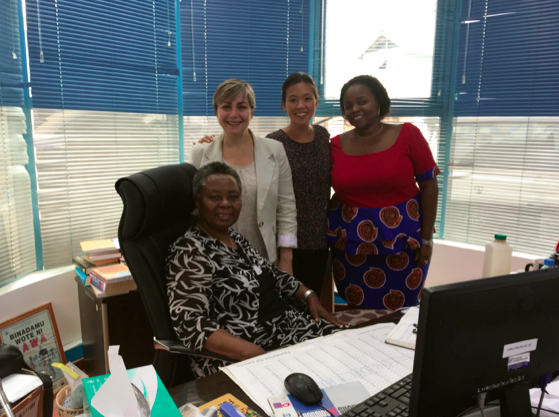On a recent GW University Facilitating Fund-supported research trip to Tanzania and Zanzibar, Paralegal Studies professors Toni Marsh and Ethel Badawi discovered that the curriculum Professor Marsh designed for the University of Bagamoyo's inaugural paralegal studies program is in use throughout the nation of Tanzania.
This is particularly significant because Tanzania - a nation of 51,000,000 people - has fewer than 3000 registered attorneys, most of whom work in the major cities of Dar es Salaam, Arusha, and Dodoma. For the majority of people throughout the vast nation, paralegals provide the only point of access to justice.
Tanzania comprises 30 regions and 169 districts. All regions and many districts have at least one paralegal clinic staffed by several paralegals. It is these paralegals that the LHRC is training using the GW curriculum.
In 2012, Professor Marsh traveled to Tanzania to design a paralegal curriculum at the University of Bagamoyo. Forty young law students and lawyers participated in the program; Professor Marsh included the students in the design process so that they learned how to design a curriculum based on local needs. They brought in working paralegals who described what they did in a typical day, week, and month and also described some typical cases from start to finish.
Using the paralegals' descriptions of the work they do, the skills they use, and the tools they need, Professor Marsh and the class designed a paralegal curriculum perfectly suited to the unique Tanzanian legal environment.
Rural Tanzanians live in small, remote communities their families have occupied for centuries. Relationships are crucial and must be preserved, so legal settlements must be negotiated and mediated rather than mandated. Therefore, a course on mediation and arbitration was included as a required course. Also, there are few funds available for paralegal clinics, which must raise their own money and obtain their own materials to operate. Therefore, a course on fundraising and office management was included as a required course.
Several students from the cohort are working in the legal and human rights fields and are having an impact in those areas.
Cohort member George Mollel Zachayo is the program director at Tanzania Network of Legal Aid (TANLAP) and cohort member Naemy Sillayo is program director at the Legal and Human Rights Centre, having previously served as director of the paralegal studies program at the University of Bagamoyo.
George Mollel Zachayo & Naemy Sillayo



